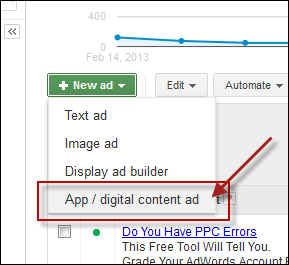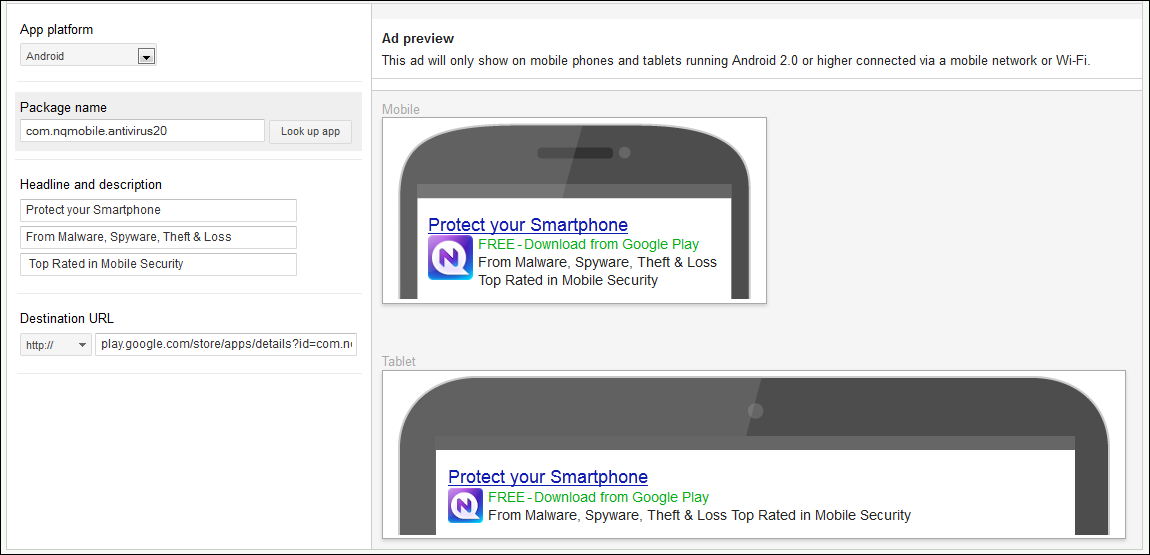How Adwords Enhanced Campaigns Can Be Used To Promote Your Mobile App
There’s been a lot of confusion among paid search marketers upset about the lack of device targeting in Enhanced Campaigns. This article will tell you how to advertise your mobile app using AdWords while checking out the new app promotion ad format in AdWords. One of the most common hypothetical use cases for device targeting […]
There’s been a lot of confusion among paid search marketers upset about the lack of device targeting in Enhanced Campaigns. This article will tell you how to advertise your mobile app using AdWords while checking out the new app promotion ad format in AdWords.
One of the most common hypothetical use cases for device targeting in AdWords has to do with mobile apps. For example, a mobile app developer who doesn’t want to target desktops because their app only works on say, iOS tablets – it would make no sense for these ads to show up on Windows desktop computer searches.
One Search Engine Land commenter wrote:

The great news for app developers and marketers is that advertising your mobile app with Enhanced Campaigns just got way easier and more targeted than ever. Here’s how!
Google Quietly Releases New Mobile App Promotion Ad Format
Enhanced Campaigns are such a big shift in how AdWords campaign management works. While Google focused on the biggest changes when announcing the news, some smaller new features and enhancements didn’t get as much attention, if any.
One of those new features is a new ad type specifically created to address the above use case: the App Promotion Ad. This new ad type offers some key benefits to mobile app developers and marketers:
- Mobile users can find and install your app directly from the SERP on their devices with a single click.
- Google automatically figures out the details; for example, if your app only runs on iPhones, Google won’t display your ad to Android users or on tablets; it just works.
- App developers can use these ads to get a large number of installs and reviews very quickly, which are key for remaining competitive in this crowded space.
The new ad format is a big improvement over the previously existing click-to-download ad format for promoting mobile apps, in that it ads a new ad creation template which makes it easier to setting up these ads, as well as smarter built-in ad targeting intelligence.
For example, at my company, WordStream, we work with a few app publishers and struggled to get the old click-to-download ad format to work properly for iTunes apps.
Why is Google offering this new ad type? Because mobile apps are big business – a $30 billion business last year, by some estimates, with over 700K Android and iPhone apps on the market today.
How To Set Up An App Promotion Ad
It’s super easy to set up one of these ads. First, note that you need to upgrade to Enhanced Campaigns for these to work. If you’ve done that, just select the “App / digital content ad” option from the “+New ad” menu.
Then, you simply choose your app platform (currently, these are only available for Android or iOS) and search for your app in the Google Play or iTunes store.
Then, write your ad text as you normally would. Google will show you a preview of how it will look on a mobile device or tablet.
And, that’s it! You’re done. You don’t have to specify what devices or operating systems you’re interested in targeting. Google will show your ads to the platforms that are compatible with your app. So, for example, you don’t need to worry about your app promotion ad showing up on a windows desktop search.
One Small Step For [A] Mobile App Marketer, One Giant Leap For Ad Intelligence
This new ad format is much easier and more powerful than the previous options for mobile app developers. It’s an exciting progression, and I wouldn’t be surprised to see Google roll out more of these kinds of ad creation templates and smarter ad formats in the future for other advertising use cases where it makes sense!
Contributing authors are invited to create content for Search Engine Land and are chosen for their expertise and contribution to the search community. Our contributors work under the oversight of the editorial staff and contributions are checked for quality and relevance to our readers. The opinions they express are their own.
Related stories
New on Search Engine Land


